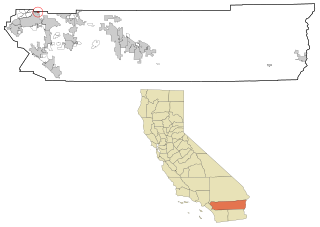
Highgrove is a census-designated place (CDP) and an unincorporated community in Riverside County, California, United States. The population was 3,988 at the 2010 census, up from 3,445 at the 2000 census. The latest 2020 census shows 7,515 total population, an 88.4% increase from last 2010 census, which makes it the fastest-growing location in entire Riverside County.

The San Bernardino Mountains are a high and rugged mountain range in Southern California in the United States. Situated north and northeast of San Bernardino and spanning two California counties, the range tops out at 11,503 feet (3,506 m) at San Gorgonio Mountain – the tallest peak in Southern California. The San Bernardinos form a significant region of wilderness and are popular for hiking and skiing.

The Colton Joint Unified School District (CJUSD) is a school district in California.

Searles Lake is an endorheic dry lake in the Searles Valley of the Mojave Desert, in northwestern San Bernardino County, California. The lake in the past was also called Slate Range Lake and Borax Lake.
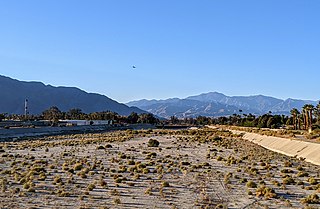
The Whitewater River is a small permanent stream in western Riverside County, California, with some upstream tributaries in southwestern San Bernardino County. The river's headwaters are in the San Bernardino Mountains, and it terminates at the Salton Sea in the Colorado Sonoran Desert. The area drained by the Whitewater River is part of the larger endorheic Salton Sea drainage basin.
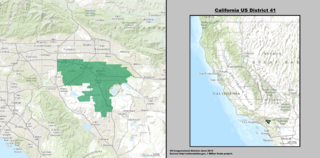
California's 41st congressional district is a congressional district in Riverside County, in the U.S. state of California. The district is currently represented by Republican Ken Calvert.
Today's Bradshaw Trail is a historic overland stage route in the western Colorado Desert of Southern California. It is a remnant of the much longer Bradshaw Road, also known as the Road to La Paz, or Gold Road, established in 1862 by William D. Bradshaw. It was the first overland route to connect the gold fields near La Paz in the U.S. New Mexico Territory, later the Arizona Territory, to Southern California's more populated west coast. Once in La Paz, additional roads provided access to the mining districts of the central New Mexico/Arizona Territory, near Wickenburg and Prescott.

San Timoteo Canyon is a river valley canyon southeast of Redlands, in the far northwestern foothills of the San Jacinto Mountains in the Inland Empire region of Southern California.

The Box Spring is a spring in Riverside County, California, around which grew the town of Box Springs. It is in the Moreno Valley, five miles (8.0 km) east-southeast of downtown Riverside on Interstate 215/State Route 60. Box Springs is named on the 7.5 quadrangle map, Riverside East (1967).

Gilman Hot Springs, also known as San Jacinto Hot Springs or the Relief Springs, is a hot spring system in the Inland Empire area of Southern California. Located near Potrero Creek, the San Jacinto River, and California State Route 79, the springs system consists of "about half a dozen" springs named for the Mexican land grant Rancho San Jacinto Viejo.

Falling Springs is an archaic placename in Los Angeles County, California. Falling Springs was the site of rustic resorts located along the north fork of the San Gabriel River in the San Gabriel Mountains along Soldier Creek, 12 miles (19 km) north-northeast of Azusa, in close proximity to Crystal Lake Recreation Area in the Angeles National Forest.
The Perris Block is the central block of three major fault-bounded blocks of the northern part of the Peninsular Ranges. The Perris Block lies between the Santa Ana Block to the west and the San Jacinto Block to the east. The Perris Block, was named by Walter A. English in 1925 for the city of Perris, located near the center of the block.

Reche Canyon is a canyon in the far northwestern foothills of the San Jacinto Mountains, northwest of The Badlands in the Inland Empire region of Southern California. The Tongva village of Homhoangna, from which the canyon's alternative names derives, was located here. The county line between San Bernardino County and Riverside County is at the approximate midway point of the canyon; the San Bernardino half to the north is mostly within the boundaries of Colton, with a small area in Loma Linda, while the southern half is unincorporated territory of Riverside County. Reche Canyon Elementary School is located in the northern part of the canyon.

Homhoangna was a Tongva village located at what is now the area in-between the Santa Ana River, Colton Avenue, and the Southern Pacific Railroad. The village is associated with the area of Colton, California.
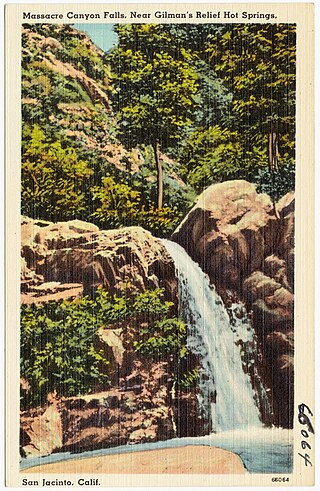
Potrero Creek is a minor waterway of Riverside County, California in the United States. Potrero Creek has a 5-mile (8.0 km)-long course and flows south through the San Jacinto River basin. Potrero Creek drains about 35 square miles (91 km2) of the San Jacinto Mountains. Potrero joins the San Jacinto River near California State Route 79, at Gilman Hot Springs, California. There are reportedly a small group of cave shelters along Potrero Creek in Massacre Canyon, south of Beaumont, on what was called the Stanton Ranch in 1962. Massacre Canyon supposedly gets its name from a battle that took place around 1540, when Temecula people massacred defenders of a village of the tribe now known as the Soboba Band of Luiseño Indians, which was called Ivah and was located at what is now Gilman Hot Springs, California.

Soboba Hot Springs are a historic hot springs and resort in Riverside County, California, United States. The springs issued from the side of a steep ravine "with narrow, precipitous sides, and the rock exposed is largely a crushed gneiss...the thermal character of the springs is due to crushing and slipping of the rocks". The Soboba Hot Springs resort was adjacent to the reservation of the Soboba Band of Luiseño Indians. Soboba means hot water in the Luiseño language.

Eden Hot Springs was a historic hot springs and resort in Riverside County, California, United States.

Urbita Hot Springs was a historic hot springs and amusement park in San Bernardino County, California, United States. Urbita Springs Park was located between E Street and Colton Street in San Bernardino where the Inland Center mall stands today.
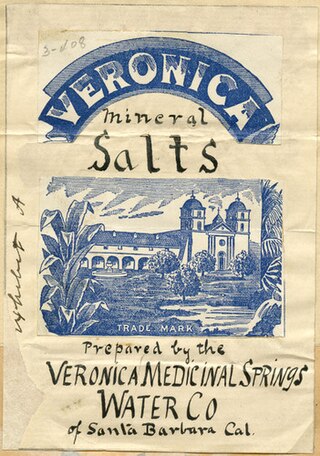
Veronica Springs, also Veronica Medicinal Springs, was a cluster of natural springs along Arroyo Burro creek in Santa Barbara County, California, United States. Veronica spring water was not a therapeutic spa water or a table water but a medicinal mineral water with high magnesium levels. The waters had a yellowish tinge and a strongly purgative-laxative effect, and beginning around 1887, the water was bottled and sold as a health tonic. Veronica Water peaked as a brand in the 1910s. The springs were capped off in 1962.




















